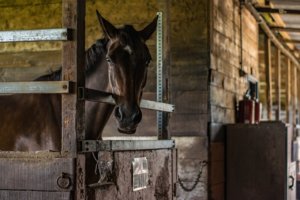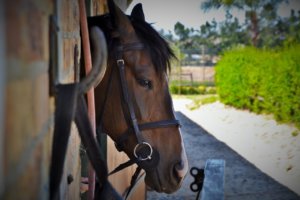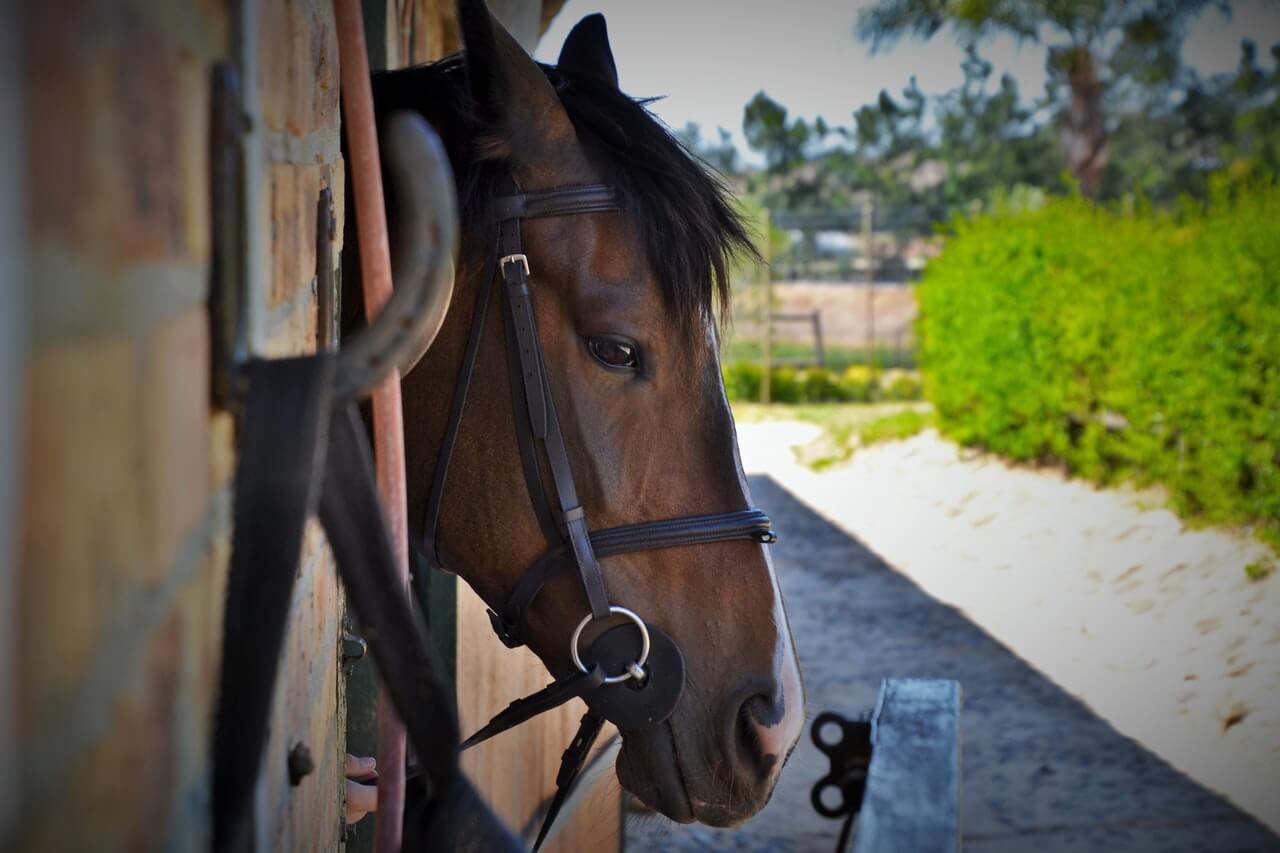Note from NWHS Publisher: One of the best “Non-Toxic” products that I’ve found is Shoofly Leggins™. These boots are sturdy. I’ve washed mine several times and they are holding up great. It keeps those nasty biting flies from landing on their lower legs where these nasty pests like to land and bite. Lowers my horse’s stress level and really worth the investment. I highly recommend. Check out their information here. ~ Karen Pickering, Publisher, The Northwest Horse Source.
There is no single solution to natural fly control for horses. Instead, an Integrated Pest Management (IPM) system incorporating a variety of different natural solutions is necessary. This means that you’ll need to identify and utilize a number of different strategies in support of one another. 
Many factors will influence your choices, including the time of year, the type of pests prominent to your area, the weather, and the physical setup of your stable, barn or pasture. In this article, we describe a collection of natural fly management techniques for horse owners. Read on to learn more.
Make the Most of Your Horse’s Built-In Protection
Your horse has a mane, tail and fetlocks for a reason. Many horse owners make the mistake of keeping this hair, as well as extra hair around ears, eyes and muzzle, clipped off short. When you do this, you rob your horse of his natural ability to deflect flies.
Remember that your horse uses his mane and tail and forelock to shake away flies. Fetlocks provide natural protection to the lower legs, and hair around the muzzle, eyes and ears baffles flies attempting to attack these sensitive areas.
Let Your Horses Cooperate
Horses like companionship for both social and practical reasons. If your horse has a pasture mate, you’re sure to see them standing head to tail. They do this so that they can protect each other with their tails. A swishing tail can keep flies away from one horse’s rump while simultaneously keeping them away from a companion’s face.
Let Your Horse Be Dirty
There’s also a reason why horses like to roll in dust and mud. A good layer of mud or dust provides a barrier against some insects. For this reason, it’s a good idea to allow your horse to stay a little dirty between rides.
Alternately, you can provide “clean dirt” to give your horse a barrier against flies. Food grade Diatomaceous earth (DE) is an all natural substance that you can use as a dust over your horse’s entire body to help divert flies and mosquitoes.
You can also hang a large burlap bag of DE from the rafters of your barn where horses can bump up against it. When they do this, they will receive an all over dusting of DE. You can get DE at your local feed store or online.
Use Physical Barriers
Instead of covering your horse with chemicals to keep the flies away from him, you can provide a physical barrier to keep the flies off. Choose from light weight, affordable, comfortable physical protection such as:
- Fly Sheets
- Fly Masks
- Fly Wraps
- Fly boots
This video from the University of Minnesota demonstrates the use of physical barriers and provides information on both natural and chemical fly repellents, as well as good barn management tips.
Engage the Help of Friendly Insects
Many feed stores and horse supply websites offer fly parasites. These are very tiny wasps that kill flies by laying eggs in their pupae, found in piles of manure. When the fly parasite eggs hatch, they attack and kill the fly larvae.
Fly parasites are absolutely harmless to animals and humans. In fact you are unlikely to even know they are present. They are that small.
To use fly parasites, you would check with your local feed store or an online horse supplier and purchase little plastic bagful. When they arrive, you’ll believe that you have been sent a bag full of sawdust.
Follow the instructions that come with the product. Typically you’ll place the bag in a warm, dark place for a few days until you see a few tiny gnats inside the bag.
When this happens, you take the substance into your barn, paddocks and pasture and bury a teaspoonful or so in as many locations as possible where flies are a problem. Naturally, you should introduce fly parasites to areas such as manure piles.
Create Your Own Fly Repellent Products
There are many good recipes available for creating natural fly repellent sprays using essential oils. Generally speaking, flies don’t like the smell of essential oils, and you can take your pick of a wide variety of combinations. Some of the best oils to use include:
- Peppermint Oil
- Oil of Lavender
- Eucalyptus Oil
- Tea Tree Oil
- Oil of Cedar
- Lemongrass
- Oil of Basil
- Catnip Oil
- Citronella
- Rosemary
- Clove Oil
- Cajeput
Be sure that any essential oils you buy are actually pure essential oil and not imitation fragrance oils.
Take care not to mix oils willy-nilly. You should never combine more than two oils at a time unless you are very well versed in the use of essential oils.
Also remember that when you use essential oils, you will probably need to reapply them far more often than chemical products. If you want to only apply fly spray once daily or every other day, you may wish to compromise a bit and use a commercial spray with Pyrethrum as its active ingredient.
Pyrethrum is a chemical that is derived from chrysanthemum blossoms. It is relatively mild, and if you use other it in combination with other, more natural solutions, you can limit the areas you spray.

Provide Insect Repellent Supplements
There are a number of natural additives that you can include in your horse’s feed to help him repel flies and mosquitoes. Among them are:
- Apple Cider Vinegar
- Diatomaceous Earth
- Brewer’s Yeast
- Sulfur
- Garlic
Many horses reject the taste of apple cider vinegar and garlic, but there are quite a few commercial supplements that have these ingredients incorporated that may be more palatable than simply adding the raw ingredients directly to your horse’s feed.
To use diatomaceous earth as a supplement to help reduce fly infestation, add about a quarter of a cup of DE to your horse’s feed for two weeks out of every month. This will help reduce fly larvae in your horse’s manure. As an added bonus, it also helps keep intestinal worms under control.
To provide your horse with sulfur, simply provide a yellow, sulfured salt block at all times. Be sure not to provide this as the only form of salt. It’s also a good idea to keep a white salt block and a mineralized salt block available as well. Your horse will know which one he needs the most.
Make Your Immediate Environment Unpleasant for Biting Flies and Mosquitoes
Keep your barn and paddock clean by picking up manure and taking it to your manure pile for composting on a regular basis.
Be sure to change the water in your watering troughs regularly to prevent the breeding of mosquito larvae. Avoid allowing mud puddles to collect around watering troughs by keeping a good layer of pea gravel around the trough at all times.
Plant decorative plants that act as natural insect repellents. Examples include marigolds and geraniums. In fact, any flowering plants that attract pollinators will help to reduce your biting fly problem because they also attract parasitic wasps (as mentioned before) which will naturally prey on the larvae of your biting fly population.
Encourage birds, lizards, toads and other natural fly predators to live in your pasture and around your barn.
Keep chickens. They love to dig up fly larvae and pupae in the barnyard and compost pile.
You Have to Stay On Top Of It
For your health and your horse’s health, it’s a good idea to make use of natural fly solutions as much as possible to limit your exposure to potentially dangerous chemicals. When you make this choice, you must also make a commitment to being dedicated in application.
Using natural solutions requires diligence, and it may require a little juggling. You’ll need to be sensitive to your situation in terms of seasonal changes, your horse’s overall health and any other factors that may affect the type and severity of pests.
No single solution will work on its own, but using a combination of the ideas presented here can be very effective in reducing the number of flies that plague your horse.
Nicky Ellis is an equestrian blogger based in Illinois. Horses have been in her life from her earliest memories, and she learned to ride a horse when she was 5. She is a mom of three who spends all her free time with her family and friends, her mare Joy, or just sipping her favorite cup of tea.






